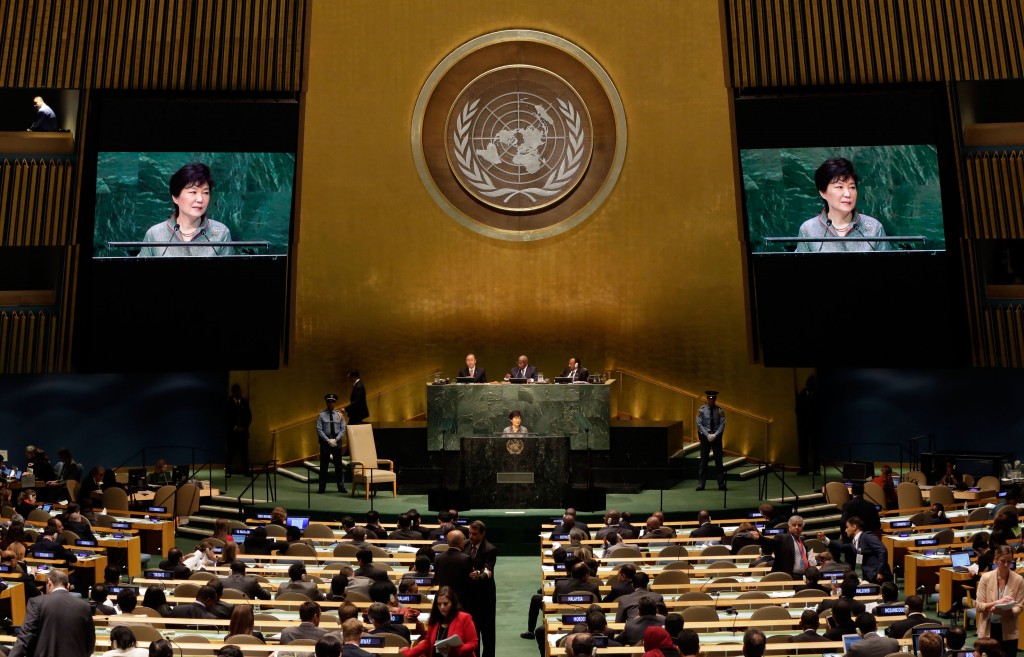- California Assembly OKs highest minimum wage in nation
- S. Korea unveils first graphic cigarette warnings
- US joins with South Korea, Japan in bid to deter North Korea
- LPGA golfer Chun In-gee finally back in action
- S. Korea won’t be top seed in final World Cup qualification round
- US men’s soccer misses 2nd straight Olympics
- US back on track in qualifying with 4-0 win over Guatemala
- High-intensity workout injuries spawn cottage industry
- CDC expands range of Zika mosquitoes into parts of Northeast
- Who knew? ‘The Walking Dead’ is helping families connect
Park addresses UN
Korean President calls on the international community to support Korea’s bid for unification

President Park Geun-hye, of South Korea, addresses the 69th session of the United Nations General Assembly, at U.N. headquarters, Wednesday, Sept. 24, 2014. (AP Photo/Richard Drew)
By Kang Seung-woo
NEW YORK — President Park Geun-hye called on the international community to support Korea’s bid for unification on Wednesday.
She expressed hope that world governments would actively engage in efforts to break down the division between the two Koreas.
“Unification on the peninsula will be the beginning of a nuclear weapons-free world and a fundamental solution to human rights abuses, resulting in a peaceful and cooperative Northeast Asia.”
Park made the statement in a speech to the U.N. General Assembly, her first address there since her inauguration in February, 2013.
At the start of the year, Park began promoting a “unification initiative,” calling a unified Korea a “bonanza,” and she used the general assembly to advocate her plan.
As part of her efforts, she has proposed a peace park in the demilitarize zone (DMZ), the de-facto border between South and North Korea.
“I want to take advantage of the DMZ Peace Park as a starting point for inter-Korean reconciliation. Should the people of the two Koreas meet there and communicate with each other, the park will establish itself as a corridor for peace on the Korean Peninsula,” she said.
Park asked the U.N. to take a leading role in the plan.
“If the United States and China as well as South and North Korea participate in the project under the leadership of the U.N., the park will be a cornerstone for peaceful unification on the peninsula.”
The President also called on the international community to take necessary measures against North Korea’s human rights abuses, and for the reclusive state to abandon its nuclear weapons program.
“North Korea’s human rights violations are an issue about which the international community is concerned,” Park told the heads of state from some 110 countries.
The U.N. Committee of Inquiry (COI) concluded in a February report that the North’s leadership was committing crimes against humanity on an unprecedented scale, and the U.N. Human Rights Council adopted a resolution urging the general assembly to formally submit the report to the Security Council.
“In order to fulfill the recommendations, North Korea and the international community should take necessary steps,” Park said.
“I expect that the U.N. human rights office to be set up in Seoul in the near future will be able to support such efforts.”
Park also asked the international community to pay attention to the human rights of North Korean defectors, as well.
Her remarks came one day after U.S. Secretary of State John Kerry hosted a high-level meeting to discuss the subject on the sidelines of the Assembly’s 69th session.
The meeting also included Foreign Minister Yun Byung-se, Japanese Foreign Minister Fumio Kishida, Australian Foreign Minister Julie Bishop, and the new U.N. high commissioner for human rights, Zeid Ra’ad Zeid al-Hussein, as well as Shin Dong-hyuk, a North Korean defector who survived a prison camp.
“We simply cannot be blind to these egregious affronts to human nature and we cannot accept it, and silence would be the greatest abuse of all,” Kerry said.
Park had also previously touched on the North’s nuclear weapons program.
“North Korea is the only country to conduct a nuclear test in the 21st century and that is at odds with the Nuclear Non-proliferation Treaty (NPT),” she said.
“The North should decide to give up its nuclear program and South Korea, along with the international community, will aggressively support its economic growth.”
North Korea has carried out three nuclear tests since 2006, the latest taking place last year, right ahead of Park’s inauguration.
Park added that amid the growing urgency to deal with weapons of mass destruction (WMD), the North’s nuclear program is the most urgent issue to be settled in the region.
Her speech came as the reclusive country threatened to conduct a “new form” of nuclear test in March, while launching more than 100 short-range rockets and missiles this year, raising tensions on the peninsula.
However, her address is likely to draw backlash from the Kim Jong-un regime.
In March, Park put forward a threefold package in an effort toward reunification — expanding humanitarian assistance and family reunions, sharing resources and developing infrastructure projects, and joint culture and education programs — in the former East German city of Dresden, but it drew tough response from the North.
In addition, North Korea has rejected the COI report, calling it a U.S.-led attempt to topple its regime.









![그룹 방탄소년단(BTS) [BTS 공식 트위터. 재판매 및 DB 금지]](http://www.koreatimesus.com/wp-content/uploads/2025/07/Untitled-5-copy-199x223.jpg)






